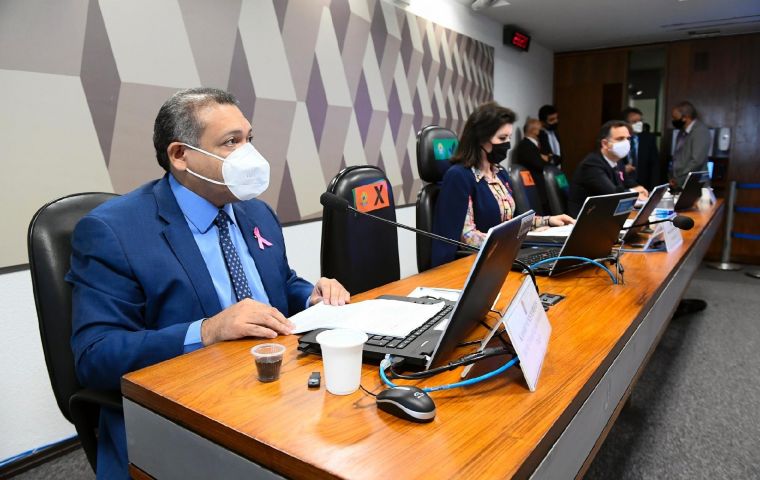MercoPress. South Atlantic News Agency
Bolsonaro's conservative candidate to the Supreme Court receives Senate approval
 Judge Kassio Nunes Marques was grilled more than nine hours by the Commission on Constitution and Justice, in which was asked about controversial issues
Judge Kassio Nunes Marques was grilled more than nine hours by the Commission on Constitution and Justice, in which was asked about controversial issues The Brazilian Senate approved, by 57 votes in favor and 10 against, the appointment of conservative Judge Kassio Nunes Marques, 48, to become minister of the STF (Supreme Federal Court). He will take over for Dean Celso de Mello, who retired this month.
First nominated by Jair Bolsonaro to the Supreme Court, Kassio is a judge at the TRF-1 (Federal Regional Court of the 1st Region) and will be able to occupy one of the 11 court seats up to 75 years of age. The date of the inauguration has not yet been defined – it will be necessary before his appointment is published in the Official Gazette by the President of the Republic.
The vote was secret, and there was an abstention – another 13 senators were absent from the session.
Earlier, Kassio participated for more than nine hours in a hearing at the Senate CCJ (Commission on Constitution and Justice), in which he responded to questions from senators and explained his position on controversial issues, such as abortion and the Lava Jato operation. The commission’s score was 22 votes in favor and 5 against.
At the CCJ, he also stated that “absolutely nobody interfered” in Bolsonaro’s decision (without a party) to nominate him for a vacancy in the STF.
In 2021 Bolsonaro will be able to make a new appointment to the STF, after the retirement of Minister Marco Aurélio Mello, in July. The president promised to nominate an evangelical for the post – names like Jorge Oliveira, recently approved by the TCU, and that of the Minister of Justice, André Mendonça, were even quoted for the chair to be occupied now by Kassio.
The last minister to join the Supreme Court in 2017 was Alexandre de Moraes, who was appointed by then President Michel Temer (MDB). Moraes took the place of Teori Zavascki, who died in a plane crash in January of that year.
In a nod to conservatives, Kassio cited a biblical psalm in the Sabbath and mentioned Catholic education as the source of his “faith in God and in Brazil”.
The judge also claimed to be a “defender of the right to life” when asked about his position regarding the legalization of abortion, but he indicated that he agreed with the existing possibilities for legal abortion: in cases of rape, of pregnancies that bring life risk to the woman. mother or anencephaly.
Asked about Lava Jato, Kassio said he recognized the merits of the operation in fighting corruption but said that “corrections can be made” if irregularities are found.
The judge defined himself as a guarantor judge, but stated that the term is not related to a position contrary to the fight against corruption.




Top Comments
Disclaimer & comment rulesCommenting for this story is now closed.
If you have a Facebook account, become a fan and comment on our Facebook Page!